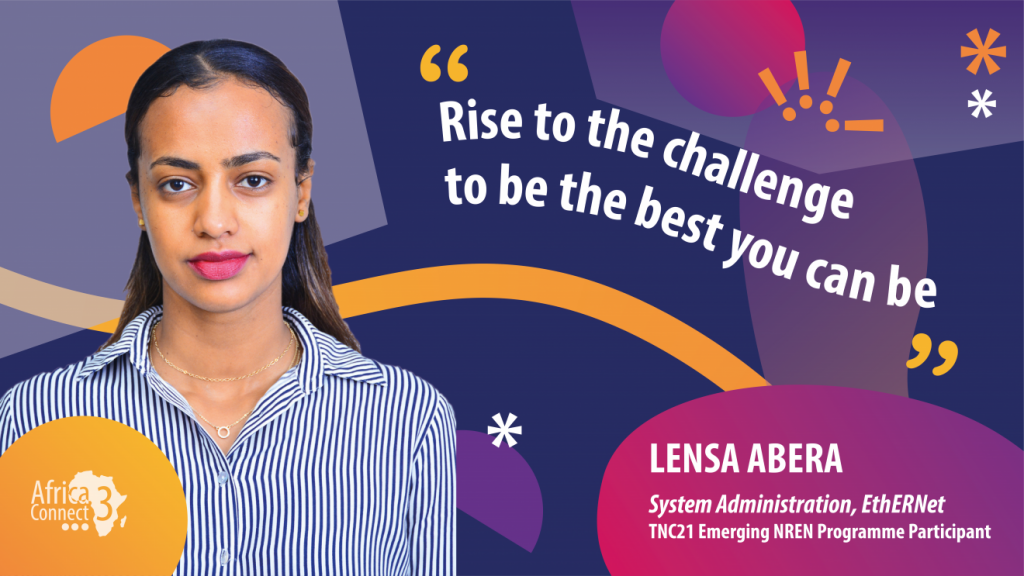Lensa, can you share with us how you first became involved in your STEM (Science, Technology, Engineering and Mathematics) field and, more specifically, in data digital repositories?
During my last three years of high school, I was interested in scientific and technological innovations. Therefore, I chose to major in computer engineering because I believe it is a door to many different fields and applications. My first exposure to digital repositories came during my last year of college when I got the chance to visit one of the government broadcasting corporate data centers and their repositories during my internship period. After graduating college, I’ve joined Ethiopian Education and Research Network (EthERNet) and get the opportunity to work on national digital repository projects. I have been working on various systems and projects such as National Research and Academic Digital Repository of Ethiopia (NRADRE), National Digital Library of Ethiopia (NADLE), Ethiopian Journals Online (EJOL).
On June 25th at TNC21, you will be speaking about the National Research and Academic Digital Repository of Ethiopia (NRADRE). Can you briefly describe what it is about and its impact on the research and education communities in your country?
National Research and Academic Digital Repository of Ethiopia is one of the systems developed and hosted by EthERNet. It intends to provide researchers, students, and lecturers access to all research works published by Ethiopian universities and research institutions. It was not easy to find a comprehensive and quality system that can capture all research publications and projects in Ethiopian higher education institutions. It is important to optimize the opportunity offered by the ever-evolving digital environment to consolidate and systematize the increasing volume of information and make it easily findable by users. NRADRE provides enough functionality that allows wide storage, accessibility, availability, and sharing of data and knowledge. The system helps researchers efficiently identify a research gap and reduce duplicate works.
Ethiopia will soon be connected to the UbuntuNet backbone. This is an extraordinary opportunity for global collaborations and more reliable high-speed connectivity for the country. How do you see the added value of NREN network and services for Ethiopian end-users?
EthERNet has been working to strengthen and attain its goals of becoming a dedicated research and education network to connect the research community. This opportunity helps us to provide high-speed, high-quality broadband infrastructure between facilities, institutions and campuses both nationally and internationally and connect them with a global network of higher education and research institutions. It will be very useful to aggregate education and research demands for connectivity and access to research data, instruments through secure much greater bandwidth. Our education and research institutions will be enhanced by establishing secure, adequate, and affordable high bandwidth network connectivity to share academic programs as well as networked applications. The network will connect our researchers and education community that represents end-users in need of reliable network capacity for linkage to the global research resource and institutions to increase scientific collaboration, greater and easy access to resources and repositories.
You are a System Administrator at the EthERNet, a role that is more commonly taken by men as, more widely speaking, the majority of the technical roles in the fields of networks and connectivity. How have you experienced the underrepresentation of women in STEM? Do you think African NRENs can do more to encourage young girls to join their teams?
As we all know men make up the majority of the workforce, and there are certainly few females in male-dominated STEM fields. It might seem difficult to pursue a carrier that is commonly taken by men, however after I have joined EthERNet, where the work environment is very supportive. I find it quite interesting and more inviting to learn new things every day. Self-learning and taking various related training has helped me a lot. The work environment creates an opportunity to challenge my mind and my technical problem-solving skills. Being able to overcome every challenge and find a solution isn’t just great as a carrier, it also helps me to be more confident.
Sure, I believe we women are natural problem solvers, and we are more able to cope with modern ways of working. Therefore, NERNS and related institutions should open their door for advancement and leveling the playing field and encourage women to have the main role in this industry. They will begin to see the benefit of a diverse workplace.
Any last inspirational message to our female readers who are committed to working in STEM?
I would like to say go for it, take every opportunity to teach yourself, and develop self-knowledge. Rise to the challenge to be the best you can be and seek the support you need. It is all about hard work, most of all, self-learning is the best way to acquire the knowledge you need in the industry.

